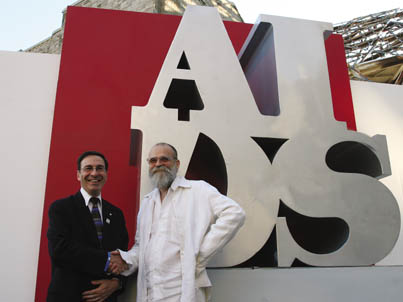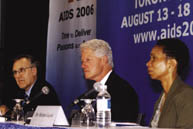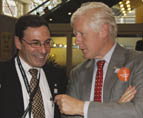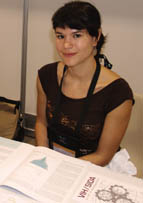
Mark Wainberg and AA Bronson at the Royal Ontario Museum unveiling of the AIDS sculpture by the Canadian arts collective General Idea
AIDS: Where are we now?
The XVI International Conference on AIDS, held in Toronto from August 13-18, represented a historic confluence of research, community activism, people living with AIDS and members of a growing and increasingly mobilized international force of individuals committed to ending HIV/AIDS. It also highlighted the enormous progress we've achieved since publication of the first cases 25 years ago.
Our greatest success is now 10 years old; the development of highly active antiretroviral therapy (HAART) that transformed HIV infection to a chronic manageable condition in affluent countries in which antiretroviral drugs are widely available. In contrast, over 20 million HIV-infected individuals in Africa will die unless they obtain access to the same life-saving drugs.

South African singer Yvonne Chaka Chaka, UNICEF spokesperson on malaria, called for integrated malaria and HIV program
In Toronto, attention also focused on scientific advances that provide hope for the future. First, clinical data were presented on two new families of antiretroviral drugs — viral integrase inhibitors and entry inhibitors — that show excellent activity against all strains of HIV, including those that are resistant to all currently approved drugs. One of these integrase inhibitors caused viral loads to plummet more sharply than has been seen with any drug studied to date, and there is hope that resistance to these drugs will be undermined by some of their unique properties.

Stephen Lewis, Bill Clinton and conference co-chair Helene Gayle speak out for HIV treatment
Another area of progress is the development of rapid saliva-based diagnostic tests to detect HIV infection. At present, the turn-around time for an antibody test is three weeks, and many subjects don't return to a doctor's office to obtain results. Soon, patients will obtain results while still in the doctor's office, obviating a tortuous three-week waiting period. This will also offer the public health benefit of informing individuals at high risk of contracting and spreading HIV sooner, therefore limiting their risk behaviour.
The XVI International Conference on AIDS delivered good news in regard to both HIV therapeutics and diagnostics. Hopefully, political action will ensure that these advances become available to people throughout the world.
The Director of the McGill University AIDS Centre, Mark Wainberg, was the Co-Chair of the XVI International Conference on AIDS. An internationally recognized HIV/AIDS researcher, Wainberg has made significant contributions to the study of anti-viral drug development and HIV drug resistance.
Search
Search (skip):

Mark Wainberg with Liberal leadership candidate Bob Rae

Canadian delegate Pascale Robitaille at the conference’s Global Village

Tara DiBenedetto, from the McGill Journal of Sustainable Development Law and Policy, at a Global Village booth

